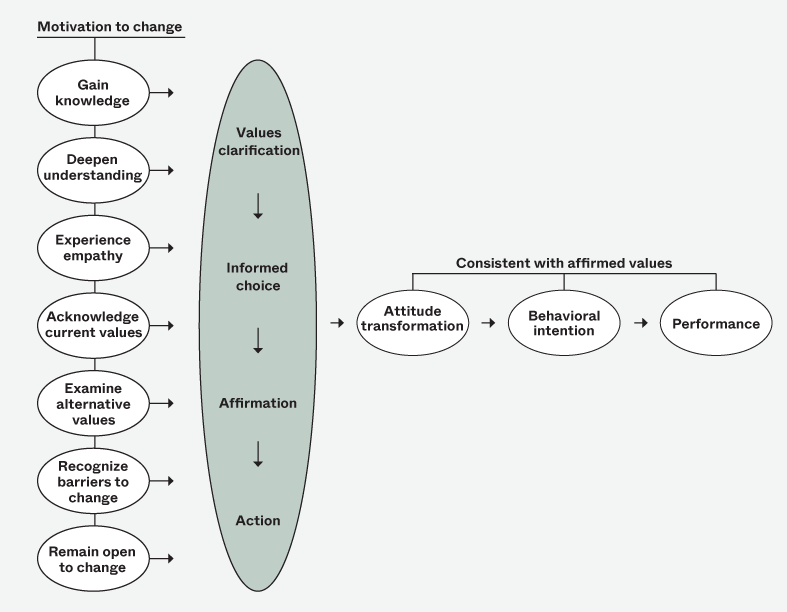What is values clarification?
Given the central role that values play in our lives, it is important to understand how values form and how they affect our decision-making and behavior. Values clarification (VC) is both a theory and an intervention that helps us ensure that our choices and actions are the result of informed, reasoned thoughts and feelings.
The theory was inspired by the field of humanistic psychology, led by such thinkers as Abraham Maslow and Carl Rogers, who believed that people are responsible for discovering their values through honest, open-minded self-examination. According to Milton Rokeach, values clarification is the process of examining one’s basic values and moral reasoning. VC is done to understand oneself: to discover what is important and meaningful. It is also a technique for encouraging learners to relate their thoughts and their feelings in order to enrich their awareness of their own values.
Since its original conception in the late 1960s, VC interventions have been applied to a variety of health and social issues. In the arena of sexual and reproductive health, VC interventions have been increasingly used to address such issues as stigma against adolescents, LGTBQI people, people living with HIV, clinicians’ willingness to perform abortion procedures and pharmacists’ willingness to fill emergency contraception prescriptions.
Skilled facilitators are essential
The process of values clarification relies on a skilled facilitator who can create a safe, comfortable space and assist participants to:
- Use rational thinking and emotional awareness to examine personal belief systems and behavior patterns
Relate their thoughts and feelings to enrich their awareness of their own values - Identify and analyze issues for which their values may conflict through thoughtful reflection and honest self-examination
- Specify how they can act in a manner consistent with their clarified value(s)
- Experience new or reframed information or knowledge designed to be accessible and relevant (personally, socially, and politically)
Theoretical framework
Abortion VCAT activities and workshops are grounded within existing cultural and social structures and ideologies. Cultural and social norms are extremely influential in shaping people’s attitudes and values. This framework places the process of values clarification within a larger context of abortion attitudes, behavioral intention, and action.

From the left of the framework above, we begin with the motivation to change—people must be open to examining and potentially changing their attitudes, values, and behaviors. When effectively engaging in abortion VCAT, one gains new knowledge, deepens their understanding, experiences empathy, acknowledges their current values, examines alternative values, recognizes barriers to change, and remains open to change. Ipas considers the three main stages of values clarification to be: making an informed choice about your values, affirming that choice, and acting on the chosen value.
Whereas the goal of a traditional values clarification intervention is for participants to investigate and understand their values in a neutral setting, the Ipas framework is designed with an expectation that identifying common personal values such as “care” or “personal autonomy,” along with understanding the harms caused by abortion restrictions and stigma, leads participants to move along a progressive continuum of support for abortion access and sexual and reproductive rights—from opposition at a personal and generalized level, to tolerance, acceptance, support, and then, ultimately to advocacy for and/or provision of abortion care.

